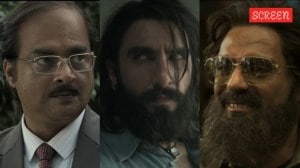Remembering Baba
Zafar Futehallys daughter pays tribute to the indefatigable conservationist who passed away last month
Zafar Futehallys daughter pays tribute to the indefatigable conservationist who passed away last month
In the early 70s,when my father started the India chapter of World Wildlife Fund (WWF),money was very tight and it must have seemed a good idea to enlist two teenage daughters for free. My beloved sister Shama,who passed away in 2004,was the one who contributed substantially and in a much more cognitive way; my role was less intellectual and consisted of stapling,typing and running out for tea and coffee. Those were the days of the large Godrej typewriter and the messy inky cyclostyling machine,so sending out the early WWF newsletters required both brains (Shama) and brawn (myself).
It was a busy,lively office,with several part-time volunteers and there was a heady atmosphere of common purpose and greater good. Naturalists like George Schaller,Paul Joslin,Toby Hodd,Steve Berwick would pass through,as did Quentin Bloxam of the Jersey Wildlife Trust; he came to pick up a lion and lioness from Junagadh Zoo for Mr (Gerald) Durrell (author),and we helped him find accommodation for them at Victoria Gardens (in Mumbai) and then fly back with them to Jersey. They were named Zai and Zafar.Quentin later informed us that,unsurprisingly,Zafar was a very good lion but Zai was naughty and troublesome.
One day,our Chennai herpetologist Rom Whitaker arrived at WWF,to ask,very nervously,for Rs 5,000 to start his snake park in Madras. He had travelled third-class in the train and was a bit out of pocket,but wanted to do the right thing by my father,a great supporter of his work and aspirations. Zafar, he said,may I borrow Rs 100 from you? Baba took out his wallet and handed over a note. Rom took a step back and said formally,May I take you out to lunch today?
Those of us who knew Baba can understand his delighted re-telling of this story,often in Roms presence. He loved the ridiculous and his own wit was a terrific moral compass for all of us. Egotism,arrogance and opportunism were constant punching bags. Babas own lack of interest in status,position or acknowledgement was,of course,sometimes very galling for us; these high-minded people are not always easy to live with. His style was to light the spark,set something on its way,then step back and let others take the credit. This we learned again and again during those WWF days and later. He was generous with praise and helped many young naturalists find their feet and become effective people in this area. One recent email from a young friend said,He not only helped me find my feet,but my head as well.
Another thing which made Baba effective and this is really something for the conservation circuit to think about very carefully is that he set aside personal differences and focused on the issue at hand. This sounds easy but we all know how difficult it is. More than anything else,I admire Baba for this because some major conservation initiatives and resultant victories,such as Silent Valley (in Kerala) and Project Tiger,would not have happened if he had been a regular human being.
In fact,he was a very irregular human being. During his recent efforts to clean and revitalise the water bodies of Bangalore,he became victim to the burning zeal of local conservationist groups because he accepted help from a large hotel chain. There were the usual loud cries of having sold out to the corporates and loss of integrity. When someone from the enemy camp came to see him and explain conservation morality,I hid in an adjoining room and carefully eavesdropped. The visitor refused tea with due morality and proceeded to explain that the conservation movement was at risk if we bowed down to these wretched corporates who are destroying the environment. Baba gently asked him if accepting donations from individuals was acceptable; Yes,of course, was the answer. But corporates are made up of individuals? And many individuals have caused untold damage to our ecosystem. It was most satisfying to hear his opponent becoming more and more loud and illogical.
Another ZF landmark was his persistence,fuelled by an unfailing faith that things could and would change. Small speed bumps like failures and cynicism didnt slow down his energy and optimism. Whether it was the effort to get the block development officer to visit Bangalores Doddagubbi lake and make a de-siltation plan,or initiating a campaign to save a banyan tree on 80 Feet Road in Koramangala,Bangalore,he just kept on and on. Sometimes though,his persistent optimism seemed a bit over the top. For instance,he actually believed that good driving practice and politeness could be taught to Bangalore taxi drivers.
He also believed that I would one day become a decent rider. He himself was the sort of rider who turned heads at professional horse events and rode until well into his 80s. The most irascible horse became a rabbit when he was on it. But it was somewhat opposite with me; the most docile mount bolted and threw me. Baba would entice me into going riding with him by saying,Well just do a slow trot,see the countryside. Id agree in good faith,but inevitably,the sight of a low hill,or gully,or avenue of trees,would defeat his good intentions and off hed gallop,with my horse,of course,following suit. On a lucky day,Id stay on the horse by the skin of my teeth and the mane of the horse. This is my one and only complaint against my father and if I could talk to him now,Id say,Baba,not everyone can gallop like you. And it would be meant both literally and metaphorically.
Zai Whitaker is a Kodaikanal-based writer and nature lover
- 01
- 02
- 03
- 04
- 05































